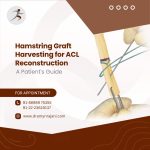Fabella Syndrome is a relatively rare condition that affects the knee, often causing significant discomfort and impairing mobility. This condition is linked to the presence of a small sesamoid bone called the fabella, which is located in the tendon of the lateral head of the gastrocnemius muscle. Despite its rarity, Fabella Syndrome can lead to substantial knee pain and functional limitations, necessitating the attention of a knee specialist. If you are experiencing knee pain or discomfort, consulting an orthopaedic doctor in Mumbai or a knee joint replacement surgeon in Mumbai can provide the necessary diagnosis and treatment options.
Understanding Fabella Syndrome
The fabella is a small, sesame seed-like bone found in some individuals' knees. Its presence is not universal, and it is typically considered a vestigial structure, meaning it has no significant function in most people. However, in certain cases, this small bone can become problematic, leading to Fabella Syndrome.
Causes of Fabella Syndrome
Fabella Syndrome is primarily caused by the presence of the fabella bone itself. This bone can cause issues when it interacts adversely with surrounding tissues or structures in the knee. The main causes of Fabella Syndrome include:
- Mechanical Irritation: The fabella can irritate surrounding soft tissues, including tendons and muscles, leading to pain and inflammation.
- Overuse or Repetitive Motion: Activities that involve repetitive knee flexion and extension, such as running or cycling, can exacerbate the condition.
- Trauma: Direct trauma to the knee can cause the fabella to become symptomatic, especially if it becomes dislodged or fractured.
- Arthritis: In some cases, arthritis in the knee joint can lead to the development of Fabella Syndrome as the bone becomes more prominent due to cartilage loss and changes in the joint structure.
Symptoms of Fabella Syndrome
The symptoms of Fabella Syndrome can vary in severity and may be similar to other knee conditions, making accurate diagnosis essential. Common symptoms include:
- Knee Pain: Pain is typically localized to the back of the knee and can range from mild to severe. The pain may worsen with physical activity, especially activities that involve knee flexion.
- Swelling: Inflammation around the fabella can lead to noticeable swelling in the knee.
- Tenderness: The area around the fabella may be tender to the touch.
- Limited Range of Motion: Pain and swelling can restrict the knee's range of motion, making it difficult to fully extend or flex the knee.
- Clicking or Popping: Some individuals may experience clicking or popping sensations in the knee, particularly when bending or extending the joint.
Diagnosis of Fabella Syndrome
Diagnosing Fabella Syndrome involves a combination of clinical evaluation and imaging studies. A knee specialist in Mumbai or an orthopaedic doctor in Mumbai will typically follow these steps:
- Medical History and Physical Examination: The doctor will take a detailed medical history to understand the onset and nature of the symptoms. During the physical examination, they will assess the knee for pain, tenderness, swelling, and range of motion.
- Imaging Studies: Imaging techniques are crucial for confirming the presence of the fabella and identifying any associated abnormalities. Common imaging studies include:
- X-rays: X-rays can reveal the presence of the fabella and any bony abnormalities.
- MRI (Magnetic Resonance Imaging): MRI provides detailed images of the soft tissues and can help identify inflammation, tendonitis, or other soft tissue issues related to the fabella.
- CT (Computed Tomography) Scans: CT scans offer detailed cross-sectional images of the knee, useful for visualizing the fabella and its relationship with surrounding structures.
Treatment Options for Fabella Syndrome
The treatment for Fabella Syndrome depends on the severity of the symptoms and the impact on the patient's daily activities. Treatment options include:
Nonsurgical Treatments
- Rest and Activity Modification: Reducing or modifying activities that exacerbate the symptoms can help alleviate pain and inflammation.
- Physical Therapy: Strengthening the muscles around the knee can help reduce the mechanical stress on the fabella and improve knee stability.
- Medications: Nonsteroidal anti-inflammatory drugs (NSAIDs) can help manage pain and reduce inflammation.
- Injections: Corticosteroid injections around the fabella can provide temporary relief from pain and inflammation.
Surgical Treatments
If nonsurgical treatments fail to provide relief, surgical options may be considered. A knee joint replacement surgeon in Mumbai can perform these procedures:
- Fabella Excision: This involves the surgical removal of the fabella. This procedure is typically recommended when the fabella is causing significant pain and functional limitations.
- Soft Tissue Repair: In some cases, repairing or releasing the soft tissues around the fabella can alleviate symptoms.
Recovery and Rehabilitation
Recovery from Fabella Syndrome depends on the treatment approach. For those undergoing nonsurgical treatments, physical therapy plays a crucial role in managing symptoms and improving knee function. For patients who require surgery, postoperative rehabilitation is essential for a successful recovery. Rehabilitation typically involves:
- Physical Therapy: Tailored exercises to strengthen the knee, improve flexibility, and restore range of motion.
- Pain Management: Medications and modalities such as ice or heat can help manage postoperative pain.
- Gradual Return to Activity: A structured plan to gradually resume daily activities and sports.
Conclusion
Fabella Syndrome, while rare, can cause significant knee pain and discomfort. Understanding its causes, symptoms, and diagnostic methods is crucial for effective management. If you are experiencing persistent knee pain, it is essential to seek the expertise of a knee specialist in Mumbai or an orthopaedic doctor in Mumbai. These professionals can provide a comprehensive evaluation and recommend appropriate treatment options, whether nonsurgical or surgical, to help you regain your knee function and quality of life. For those with severe cases, consulting a knee joint replacement surgeon in Mumbai can offer advanced surgical solutions to address the condition effectively.
Find Relief from Fabella Syndrome with Dr. Amyn Rajani - Expert Knee Specialist in Mumbai
Suffering from knee pain due to Fabella Syndrome? Dr. Amyn Rajani, a leading knee specialist in Mumbai, offers expert diagnosis and personalized treatment plans to help you regain mobility and live pain-free. Don’t let knee pain hold you back—schedule your consultation with Dr. Rajani today and take the first step towards a healthier, more active life.
For more information or to book a consultation with Dr. Amyn Rajani, visit OAKS clinic at Hughes Road, Mumbai or website www.dramynrajani.com or simply call on Clinic Number 91-88989 75355 / 91-22-23619137 to take the first step towards a pain-free future.




